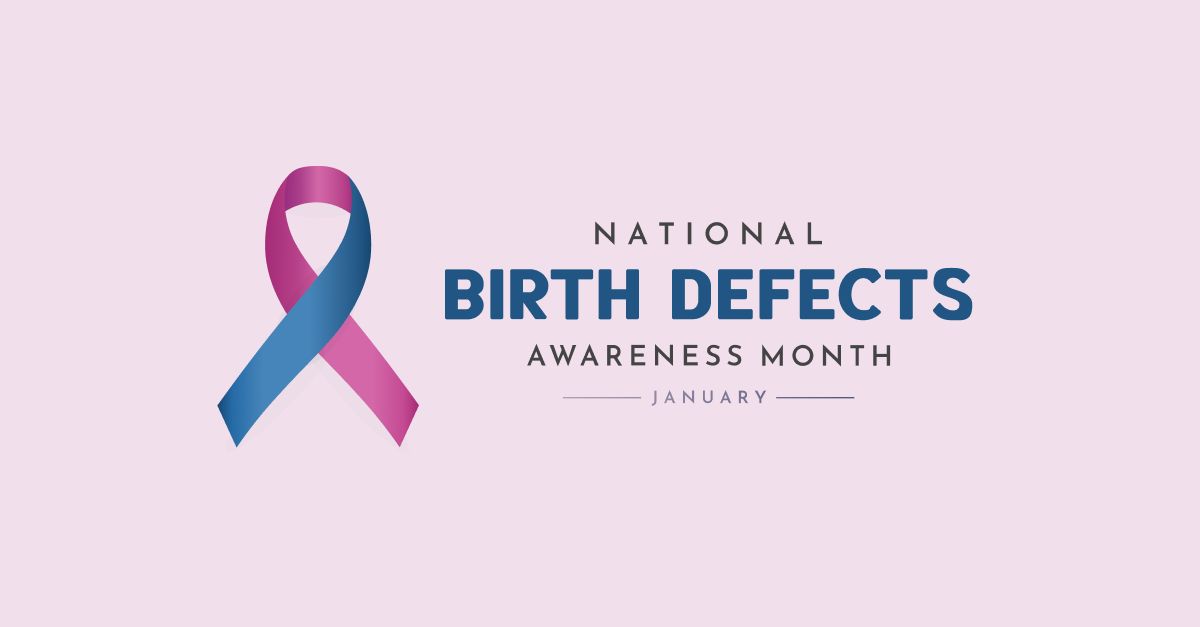January Is National Birth Defects Awareness Month

National Birth Defects Awareness Month is a time to raise awareness, promote healthy pregnancies, and support those impacted by birth defects. Every 4.5 minutes, a baby is born with a condition that affects the structure or function of their body. While progress has been made, birth defects continue to affect many families. Learn more about birth defects and get tips for preventing them.
Understanding Birth Defects and Birth Injuries
A birth defect, also known as a congenital birth defect, develops during pregnancy, often while a baby is still in the womb. These defects can be caused by genetic, environmental, or even unknown factors.
As a medical term, "birth defect" refers to conditions that develop before birth. To be more accurate, it's best to use the specific name of a condition when possible, according to the Centers for Disease Control and Prevention (CDC).
For example, cerebral palsy (CP) is often linked to brain injury or lack of oxygen during birth, but it can sometimes be congenital, meaning it develops before birth.
A birth injury, on the other hand, happens when a baby is harmed before, during, or shortly after delivery. Unlike birth defects, which are usually present at birth, birth injuries usually result from complications during delivery.
National Birth Defects Awareness Month helps spread important information on how to prevent birth defects and related conditions.
“We strive to promote healthy choices that increase the chances of having a healthy pregnancy, and in turn, reduce the risks of pregnancy complications and/or birth defects.”
– National Birth Defects Prevention Network
How to Prevent Birth Defects: 7 Tips
Birth defects affect 1 in every 33 babies in the U.S. each year, according to the CDC. Risk factors include genetics, medications like isotretinoin, and medical conditions like poorly managed diabetes.
Some health conditions can be prevented. For example, prenatal care can reduce the risk of complications that might lead to brain damage and conditions like cerebral palsy.
Here are 7 tips to help reduce the risk of birth defects:
- Avoid alcohol, tobacco, and secondhand smoke.
- Consult with your doctor before taking over-the-counter medications.
- Do not consume raw fish or undercooked meat.
- Make sure you’re up-to-date on vaccines before trying to get pregnant.
- Manage pre-existing conditions, like high blood pressure and diabetes.
- Take folic acid daily to help prevent damage to the brain and spine.
- Visit your primary care doctor and obstetrician regularly.
These steps can help manage conditions that affect oxygen supply and detect issues like infections or placental problems. However, not all causes of cerebral palsy or birth defects are preventable.
“National Birth Defects Awareness Month is an opportunity for us to raise awareness and share birth defects prevention tips. It is also a vital time for us to consider the systems in which communities where people live that may lead to certain birth defects and the barriers they face in access to health care and equity in living.”
– Association of Maternal & Child Health Programs (AMCHP)
The Importance of Raising Awareness of Birth Defects
Even simple actions, like sharing a post about birth defects on social media, can help during National Birth Defect Awareness Month. Raising awareness is valuable for many important reasons.
Benefits of raising awareness of birth defects include:
- Encouraging expectant parents to research medical and birth teams: Choosing the right doctor before delivery can reduce the risk of complications or negligence.
- Helping educate both experienced and new parents: This can inspire lifestyle changes that promote a healthy pregnancy and baby.
- Putting disorders like cerebral palsy in the public eye: Increased awareness can lead to more funding for research, better treatment, and improved CP prevention.
If you want to show your support on social media this January, consider using official hashtags like #NBDAM or #EveryJourneyMatters.
Additionally, volunteering, attending an awareness event, and connecting with parents and caregivers of children with disabilities are all great ways to get involved.
Supporting Birth Defect Research and Prevention
National Birth Defects Awareness Month is a great time to show support for doctors, surgeons, and scientists who are making strides in preventing and treating birth defects.
When people take action to raise awareness, they inspire others to get involved. An afternoon of volunteering or a timely social media post can make a real difference.
Cerebral Palsy Guide is committed to supporting families affected by CP and other conditions. Our team has gathered information on community and financial support organizations.
If your child is living with cerebral palsy or another disability, these organizations can help you access financial assistance and connect you with resources to ensure the best possible care.
